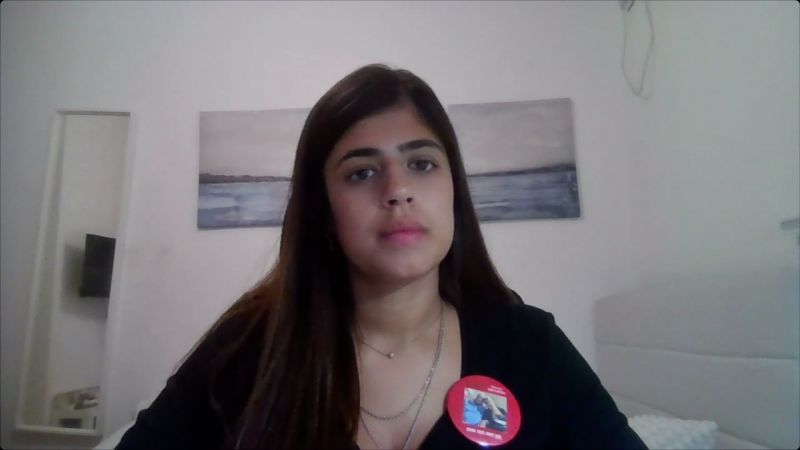After enduring nearly seven weeks of uncertainty about the fate of family members kidnapped by Hamas, relatives of hostages were left with hope and a new set of anxieties after Israel and the militant group reached a breakthrough deal on Tuesday that will see a four-day humanitarian pause to allow the release of at least 50 Israeli women and children.
While the exact names of the hostages to be released has yet to be publicized by the government, officials say some have dual nationality. The Israeli military says Hamas is holding 239 hostages in Gaza, including foreign nationals from dozens of countries, who were taken during the October 7 attack.
Hamas militants stormed her kibbutz of Nir Oz on October 7, killing Kalderon’s mother and her niece while kidnapping her two children, Sahar and Erez, and their father Ofer. The 56-year-old says the last message she received from her son, who was staying in his father’s house that day, was: “Mum, be quiet, don’t move.”
After hearing about Tuesday’s deal, Thomas Hand said he wanted “to jump through the roof with hope. But I also have to keep a level head emotionally… I can’t let myself get too far ahead.”
It has been a period of anguish and hope for Hand, who was initially told his 8-year-old daughter Emily had died in the October 7 attack. Weeks later, Israeli officials told him that they’re not sure Emily was killed. They haven’t located her body and didn’t find any blood in the home where she was sleeping.
On October 7, Roman’s cousin, Yarden Roman-Gat, 36, handed her 3-year-old daughter to her husband hoping he could run faster as they tried to flee Hamas gunman. Her husband and child were able to escape, but Yarden has been missing ever since.
“As it seems, we’re going to have to wait and see every day who are going to be released the following day and that’s going to be extremely hard,” Roman continued, adding it’s causing a lot of tensions among the different families.
“For our family we have spent the last seven weeks worrying, wondering, praying, hoping,” she said.
“The one thing that we all hold on to is that hope now that Abigail comes home, she comes home by Friday,” she added. “Friday is her 4th birthday. We need to see Abigail come out and then we will be able to believe it.”
Some 1,200 people were killed in Israel during Hamas’ attack. Israel’s ensuing war with the group in Gaza has killed more than 12,000 Palestinians, including an estimated 5,000 children, according to the Hamas-run government’s press office.
Under the terms of the deal, which was approved by Israel’s cabinet overnight, Israel will release 150 Palestinian prisoners, who are all women and children, according to Hamas. It will also allow the entry of hundreds of trucks carrying relief, medical and fuel to the devastated enclave, Gaza.
Up to 83 Palestinian women and 380 children under the age of 18 are being held in Israeli prisons, more than half of whom have been detained since October, according to the Palestinian Prisoner’s Society, a non-governmental organization.
There are some 8,300 Palestinian prisoners held in Israeli jails, according to Qadura Fares, the head of the Palestinian Commission for Detainees and Ex-Prisoners’ Affairs, 3,000 of whom are held in what is known as administrative detention, meaning they are held without known charges against them or an ongoing legal process.
There is potential for the truce to extend beyond the four-day period, where an extra day would be added to the truce for each 10 additional hostages available for release. On Wednesday, the Israeli government published a list with the names of 300 Palestinian prisoners as it offered the possibility of a second phase of exchanges of prisoners for hostages.
Anat Moshe Shoshany, whose grandmother was kidnapped from Nir Oz on the back of a moped, said hearing that the Israeli cabinet had approved a deal for the release of some hostages held by Hamas gave her “so much hope.”
As the war grinds into its 47th day Wednesday, families have learned to be patient, she said. “Because we can’t stand to fill all our hopes up and to (be) disappointed – but I really do hope to see someone walking out of there. I think it will fill us with hope for others.”
The deal gives some breathing room for Prime Minister Benjamin Netanyahu, who many in Israel blame for failing to anticipate the October 7 attack, and for the lack of progress in securing hostage releases.
“This is what we wanted for our loved ones, to start coming back, and you see that,” she said.
“The one thing that’s important to us here is to get the hostages back. Me and my family kept faith all this time that our government really was putting the hostages at the top of the priority list.”
CLARIFICATION: This story has been updated to clarify Qadura Fares’ title.
